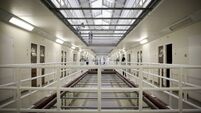Irish GDP expected to contract this year with bank revising forecast

'Current buoyant rates of employment and population growth are not sustainable in the longer-term, evident in pressures on housing, infrastructure and public services,' said BoI chief economist Conall Mac Coille.
Bank of Ireland revised down its forecast for a key measurement of growth, but remained optimistic amid increasing export levels, despite challenges in the global manufacturing sector.
Bank of Ireland again revised down forecast for Irish gross domestic product (GDP), which measures the output of multinationals, to a -1% contraction for this year due to the statistical distortions.














